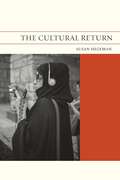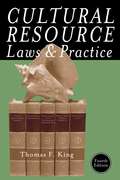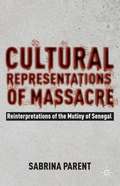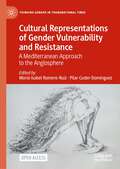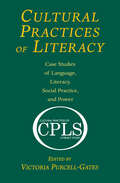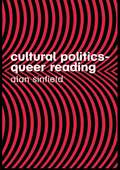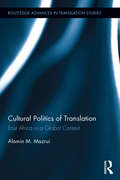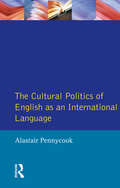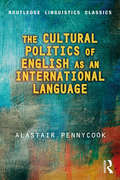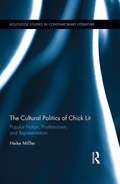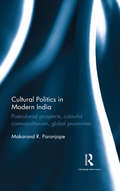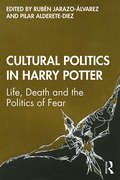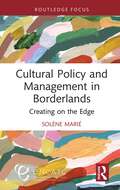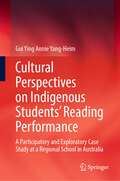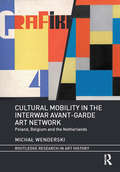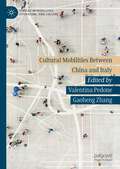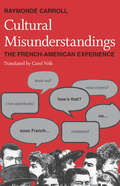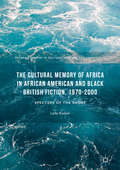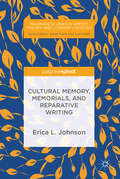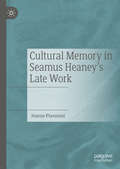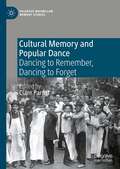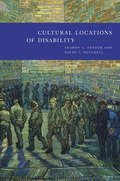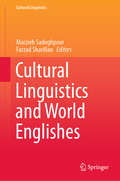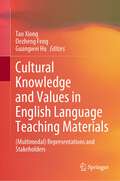- Table View
- List View
The Cultural Return
by Susan HegemanThis insightful book tracks the concept of culture across a range of scholarly disciplines and much of the twentieth and early twenty-first centuries--years that saw the emergence of new fields and subfields (cultural studies, the new cultural history, literary new historicism, as well as ethnic and minority studies) and came to be called "the cultural turn." Since the 1990s, however, the idea of culture has fallen out of scholarly favor. Susan Hegeman engages with a diversity of disciplines, including anthropology, literary studies, sociology, philosophy, psychology, and political science, to historicize the rise and fall of the cultural turn and to propose ways that culture may still be a vital concept in the global present.
Cultural Resource Laws and Practice (Heritage Resource Management Series) (Fourth Edition)
by Thomas F. KingIn this fourth edition of the CRM classic, Thomas F. King shares his expertise in dealing with laws regulating the use of cultural resources. He explains the various federal, state, and local laws governing the protection of resources, how they have been interpreted, how they operate in practice, and even how they are sometimes in contradiction with each other.
Cultural Representations of Massacre
by Sabrina ParentIn this book, Parent puts together a history of representations of the 1944 mutiny in Senegal. Combining firsthand analysis of the works and their intertextual interactions as well an external perspective, Parent engages with history, literature, film, poetics, and politics and highlights the importance of remembering the past.
Cultural Representations of Gender Vulnerability and Resistance: A Mediterranean Approach to the Anglosphere (Thinking Gender in Transnational Times)
by Maria Isabel Romero-Ruiz Pilar Cuder-DomínguezThis Open Access book considers the cultural representation of gender violence, vulnerability and resistance with a focus on the transnational dimension of our contemporary visual and literary cultures in English. Contributors address concepts such as vulnerability, resilience, precarity and resistance in the Anglophone world through an analysis of memoirs, films, TV series, and crime and literary fiction across India, Ireland, Canada, Australia, the US, and the UK. Chapters explore literary and media displays of precarious conditions to examine whether these are exacerbated when intersecting with gender and ethnic identities, thus resulting in structural forms of vulnerability that generate and justify oppression, as well as forms of individual or collective resistance and/or resilience. Substantial insights are drawn from Animal Studies, Critical Race Studies, Human Rights Studies, Post-Humanism and Postcolonialism. This book will be of interest to scholars in Gender Studies, Media Studies, Sociology, Culture, Literature and History.Grant FFI2017-84555-C2-1-P (research Project “Bodies in Transit: Genders, Mobilities, Interdependencies”) funded by MCIN/AEI/ 10.13039/501100011033 and by “ERDF A way of making Europe.”
Cultural Practices of Literacy: Case Studies of Language, Literacy, Social Practice, and Power
by Victoria Purcell-GatesThis volume presents case studies of literacy practices as shaped by culture, language, community, and power. Covering a range of contexts and exploring a number of relevant dimensions in the evolving picture of literacy as situated, multiple, and social, the studies are grouped around four overarching themes:*Language, Literacy, and Hegemony;*The Immigrant Experience: Language, Literacies, and Identities;*Literacies In-/Out-of-School and On the Borders; and*New Pedagogies for New Literacies. It is now generally recognized that literacy is multiple and woven within the sociocultural lives of communities, but what is not yet fully understood is how it is multiple--how this multiplicity plays out across and within differing sociocultural contexts. Such understanding is critical for crafting school literacy practices in response to the different literacy sets brought to school by different learners. Toward this end it is necessary to know what those sets are composed of. Each of the case studies contributes to building this knowledge in new and interesting ways. As a whole the book provides a rich and complex portrait of literacy-in-use. Cultural Practices of Literacy: Case Studies of Language, Literacy, Social Practice, and Power advances sociocultural research and theory pertaining to literacy development as it occurs across school and community boundaries and cultural contexts and in and out of school. It is intended for researchers, students, professionals across the field of literacy studies and schooling, including specialists in family literacy, community literacy, adult literacy, critical language studies, multiliteracies, youth literacy, international education, English as a second language, language and social policy, and global literacy.
Cultural Politics - Queer Reading (New Cultural Studies)
by Alan SinfieldFollowing a first edition that generated wide-spread debate, Cultural Politics – Queer Reading is a bold study of the future of critical theory and the role of gender, ethnicity and cultures within academic literary studies.An illuminating introduction to the second edition revisits the book's agenda for a new form of cultural critique and a truly political lesbian and gay studies. Sinfield renews his call for an 'Englit' that incorporates ongoing study of the cultures of ethnicity, gender and sexuality.Challenging the assumptions that have shaped the study of English literature, Sinfield engages provocatively with topics such as the gendering of literary culture, the sexual politics of psychoanalysis during the Cold War and the history of cultural materialism. He discusses such key figures as William Shakespeare, Christopher Marlowe, Walt Whitman, Arthur Miller, Holly Hughes, Audre Lorde and Jeanette Winterson.This influential investigation of the principles and practice that may form dissident reading, forms compelling argument for intellectual allegiances beyond the academy.
Cultural Politics of Translation: East Africa in a Global Context (Routledge Advances in Translation and Interpreting Studies)
by Alamin M. MazruiThis book is the first full-length examination of the cultural politics at work in the act of translation in East Africa, providing close critical analyses of a variety of texts that demonstrate the myriad connections between translation and larger socio-political forces. Looking specifically at texts translated into Swahili, the book builds on the notion that translation is not just a linguistic process, but also a complex interaction between culture, history, and politics, and charts this evolution of the translation process in East Africa from the pre-colonial to colonial to post-colonial periods. It uses textual examples, including the Bible, the Qur’an, and Frantz Fanon’s Wretched of the Earth, from five different domains – religious, political, legal, journalistic, and literary – and grounds them in their specific socio-political and historical contexts to highlight the importance of context in the translation process and to unpack the complex relationships between both global and local forces that infuse these translated texts with an identity all their own. This book provides a comprehensive portrait of the multivalent nature of the act of translation in the East African experience and serves as a key resource for students and researchers in translation studies, cultural studies, post-colonial studies, African studies, and comparative literature.
The Cultural Politics of English as an International Language (Language In Social Life)
by Alastair PennycookCovering a wide range of areas including international politics, colonial history, critical pedagogy, postcolonial literature and applied linguitics, this book examines ways to understand the cultural and political implications of the global spread of English.Firstly, it explores how a particular view of English as an international language has come into being by examining its colonial origins, its connections to linguistics and applied linguistics, and its relationships to the global spread of teaching practices. It then offers an alternative, critical understanding through the concept of the 'worldliness' of English. This concept suggests that English can never be removed from the social, cultural, economic or political contexts in which it is used.
The Cultural Politics of English as an International Language (Routledge Linguistics Classics)
by Alastair PennycookA much-cited and highly influential text by Alastair Pennycook, one of the world authorities in sociolinguistics, The Cultural Politics of English as an International Language explores the globalization of English by examining its colonial origins, its connections to linguistics and applied linguistics, and its relationships to the global spread of teaching practices. Nine chapters cover a wide range of key topics including: international politics colonial history critical pedagogy postcolonial literature. The book provides a critical understanding of the concept of the ‘worldliness of English’, or the idea that English can never be removed from the social, cultural, economic or political contexts in which it is used. Reissued with a substantial preface, this Routledge Linguistics Classic remains a landmark text, which led a much-needed critical and ideologically-informed investigation into the burgeoning topic of World Englishes. Key reading for all those working in the areas of Applied Linguistics, Sociolinguistics and World Englishes.
The Cultural Politics of Chick Lit: Popular Fiction, Postfeminism and Representation (Routledge Studies in Contemporary Literature)
by Heike MisslerChick lit is the marketing label attributed to a surge of books published in the wake of Helen Fielding's Bridget Jones's Diary (1996) and Candace Bushnell's Sex and the City (1997). Branded by their pink or pastel-coloured book covers, chick-lit novels have been a highly successful and ubiquitous product of women's popular culture since the late 1990s. This study traces the evolution of chick lit not only as a genre of popular fiction, but as a cultural phenomenon. It complicates the genealogy of the texts by situating them firmly in the context of age-old debates about female literary creation, and by highlighting the dynamics of the popular-fiction market. Offering a convincing dissection of the formula which lies at the heart of chick lit, as well as in-depth analyses of a number of chick-lit titles ranging from classic to more recent and edgier texts, this book yields new insights into a relatively young field of academic study. Its close readings provide astute assessments of chick lit's notoriously skewed representational politics, especially with regard to sexuality and ethnicity, which feed into current discussions about postfeminism. Moreover, the study makes a unique contribution to the scholarly debate of chick lit by including an analysis of the (online) fan communities the genre has fostered. The Cultural Politics of Chick Lit weaves a sound methodological network, drawing on reader-response criticism; feminist, gender, and queer theory; affect studies; and whiteness studies. This book is an accessible and engaging study for anyone interested in postfeminism and popular culture.
Cultural Politics in Modern India: Postcolonial prospects, colourful cosmopolitanism, global proximities
by Makarand R. ParanjapeIndia’s global proximities derive in good measure from its struggle against British imperialism. In its efforts to become a nation, India turned modern in its own unusual way. At the heart of this metamorphosis was a "colourful cosmopolitanism," the unique manner in which India made the world its neighbourhood. The most creative thinkers and leaders of that period reimagined diverse horizons. They collaborated not only in widespread anti-colonial struggles but also in articulating the vision of alter-globalization, universalism, and cosmopolitanism. This book, in revealing this dimension, offers new and original interpretations of figures such as Kant, Tagore, Heidegger, Gandhi, Aurobindo, Gebser, Kosambi, Narayan, Ezekiel, and Spivak. It also analyses cultural and aesthetic phenomena, from the rasa theory to Bollywood cinema, explaining how Indian ideas, texts, and cultural expressions interacted with a wider world and contributed to the making of modern India.
Cultural Politics in Harry Potter: Life, Death and the Politics of Fear
by Rubén Jarazo-Álvarez Pilar Alderete-DiezCultural Politics in Harry Potter: Life, Death and the Politics of Fear is the first book-length analysis of topics, such as death, fear and biopolitics in J.K. Rowling’s work from controversial and interdisciplinary perspectives. This collection brings together recent theoretical and applied cultural studies and focuses on three key areas of inquiry: (1) wizarding biopolitics and intersected discourses; (2) anxiety, death, resilience and trauma; and (3) the politics of fear and postmodern transformations. As such, this book: provides a comprehensive overview of national and gender discourses, as well as the transiting bodies in-between, in relation to the Harry Potter books series and related multimedia franchise; situates the transformative power of death within the fandom, transmedia and film depictions of the Potterverse and critically deconstructs the processes of subjectivation and legitimation of death and fear; examines the strategies and mechanisms through which cultural and political processes are managed, as well as reminding us how fiction and reality intersect at junctions, such as terrorism, homonationalism, materialism, capitalism, posthumanism and technology. Exploring precisely what is cultural about wizarding politics, and what is political about culture, this book is key reading for students of contemporary literature, media and culture, as well as anyone with an interest in the fictional universe and wizarding world of Harry Potter.
Cultural Policy and Management in Borderlands: Creating on the Edge (ENCATC Advances in Cultural Management and Policy)
by Solène MariéThis book uncovers the processes at play in the development of cultural policies, projects and networks in spaces at the edge of their countries, marked by their proximity with a borderline.On a subject which is studied mainly in North America and Western Europe and based on individual case studies, its originality lies in offering a comparative view on the subject, as well as in comparing a European case – the France-Germany borderlands – to a South American case – the Brazil-Uruguay borderlands. Through a multi-sited ethnographic study, the author develops an analysis of the formal and informal processes and networks which sustain this cultural action, looking at the relative contribution of processes led by institutions, cultural agents and the civil society.This book provides theoretical tools for the analysis of the way cultural ecosystems function in borderlands and is valuable reading for scholars of cultural policy, geography and arts management.
Cultural Perspectives on Indigenous Students’ Reading Performance: A Participatory and Exploratory Case Study at a Regional School in Australia
by Gui Ying Yang-HeimThis book explores the contextual, particularly cultural-related, factors that may impact reading outcomes of young Indigenous learners in their early years, underpinned by the conceptual framework of cultural capital originated by Bourdieu. By drawing upon a participatory and exploratory case study, conducted at a regional school in Australia over a period of six months, it highlights the challenges that Indigenous students face in reading, and how the contextual factors contribute to Indigenous students’ development in reading skills and their reading performance. This book helps readers to gain a better and deeper understanding of Indigenous culture, the importance of the role that culture plays in Indigenous children’s literacy education, and how it shapes the way they learn and think.
Cultural Mobility in the Interwar Avant-Garde Art Network: Poland, Belgium and the Netherlands (Routledge Research in Art History)
by Michał WenderskiThis book explores the issue of cultural mobility within the interwar network of the European avant-garde, focusing on selected writers, artists, architects, magazines and groups from Poland, Belgium and Netherlands. Regardless of their apparent linguistic, cultural and geographical remoteness, their mutual exchange and relationships were both deep and broad, and of great importance for the wider development of interwar avant-garde literature, art and architecture. This analysis is based on a vast research corpus encompassing original, often previously overlooked periodicals, publications and correspondence gathered from archives around the world.
Cultural Mobilities Between China and Italy (Studies in Mobilities, Literature, and Culture)
by Valentina Pedone Gaoheng ZhangThis book offers a critical analysis of global mobilities across China and Italy in history. In three periods in the twentieth century, new patterns of physical mobilities and cultural contact were established between the two countries which were either novel at the time of their emergence or impactful on subsequent periods. The first two chapters provide overviews of writings by Italians in China and by Chinese in Italy in the twentieth century. The remaining chapters cover: Republican China’s relationships with Italy and Italian Fascist colonialism in China during the 1920s–1930s; Italian travelers to China during the Cold War from the 1950s to the 1970s; migrations between China and Italy during the 2000s–2010s. In analyzing these cultural mobilities, this book opens a new line of inquiry in Chinese-Italian Cultural Studies, which has been dominated by historical study, and contributes a significant case study to the scholarship on global cultural mobilities.
Cultural Misunderstandings: The French-American Experience
by Raymonde Carroll translated by Carol VolkRaymonde Carroll presents an intriguing and thoughtful analysis of the many ways French and Americans—and indeed any members of different cultures—can misinterpret each other, even when ostensibly speaking the same language. Cultural misunderstandings, Carroll points out, can arise even where we least expect them—in our closest relationships. The revealing vignettes that Carroll relates, and her perceptive comments, bring to light some fundamental differences in French and American presuppositions about love, friendship, and raising children, as well as such everyday activities as using the telephone or asking for information.
Cultural Misunderstanding: The French-American Experience
by Carol Volk Raymond CarrollMy studies in anthropology had not entirely prepared me. From something theoretical and exciting, anthropology abruptly became something difficult to live.
The Cultural Memory of Africa in African American and Black British Fiction, 1970-2000
by Leila KamaliThis book offers a new approach to reading the cultural memory of Africa in African American fiction from the post-Civil Rights era and in Black British fiction emerging in the wake of Thatcherism. The critical period between the decline of the Civil Rights Movement and the dawn of the twenty-first century saw a deep contrast in the distinctive narrative approaches displayed by diverse African diaspora literatures in negotiating the crisis of representing the past. Through a series of close readings of literary fiction, this work examines how the cultural memory of Africa is employed in diverse and specific negotiations of narrative time, in order to engage and shape contemporary identity and citizenship. By addressing the practice of "remembering" Africa, the book argues for the signal importance of the African diaspora's literary interventions, and locates new paradigms for cultural identity in contemporary times.
Cultural Memory, Memorials, and Reparative Writing (Palgrave Studies in Affect Theory and Literary Criticism)
by Erica L. JohnsonCultural Memory, Memorials, and Reparative Writing examines the ways in which memory furnishes important source material in the three distinct areas of critical theory, memoir, and memorial art. The book first shows how affect theorists have increasingly complemented more traditional archival research through the use of “academic memoir.” This theoretical piece is then applied to memoir works by Caribbean writers Dionne Brand and Patrick Chamoiseau, and the final case study in the book interprets as memorial art Kara Walker’s ephemeral 80,000 pound sugar sculpture of 2014. Memory as method; memory as archive; memorial as affect: this book looks at the interplay between archival sources on the one hand, and the affective memories, both personal and collective, that flow from, around, and into the constantly shifting record of the past.
Cultural Memory in Seamus Heaney’s Late Work
by Joanne PiavaniniCultural Memory in Seamus Heaney’s Late Work considers the ways that memory functions in Heaney’s poetry. Joanne Piavanini argues that the shaping of collective memory is one of Heaney’s major contributions as a poet. Locating Heaney in a transnational literary sphere, this book argues that his late work isdefined by a type of cosmopolitanism openness: the work moves beyond national identity to explore multiple allegiances and identifications. Moreover, Piavanini demonstrates that memory is a helpful lens to look at Heaney’s late work, in particular, because of the interplay of past, present and future in these works: in the construction of a collective memory of the Troubles; in the use of the elegy to commemorate the passing of important contemporary poets; in his writing on events with transnational significance, such as 9/11; in the slippages between past and present in poems about his family; and through the literary afterlives of texts—specifically, his appropriation of canonical classical texts. Drawing on approaches and concepts from memory studies, Piavanini considers Heaney’s late work to develop an analysis of poetry as a vehicle of memory.
Cultural Memory and Popular Dance: Dancing to Remember, Dancing to Forget (Palgrave Macmillan Memory Studies)
by Clare ParfittThis book focuses on the myriad ways that people collectively remember or forget shared pasts through popular dance. In dance classes, nightclubs, family celebrations, tourist performances, on television, film, music video and the internet, cultural memories are shared and transformed by dancing bodies adapting yesterday’s steps to today’s concerns. The book gathers emerging and seasoned scholarly voices from a wide range of geographical and disciplinary perspectives to discuss cultural remembering and forgetting in diverse popular dance contexts. The contributors ask: how are Afro-diasporic memories invoked in popular dance classes? How are popular dance genealogies manipulated and reclaimed? What is at stake for the nation in the nationalizing of folk and popular dances? And how does mediated dancing transmit memory as feelings or affects? The book reveals popular dance to be vital to cultural processes of remembering and forgetting, allowing participants to pivot between alternative pasts, presents and futures.
Cultural Locations of Disability
by David T. Mitchell Sharon L. SnyderIn Cultural Locations of Disability, Sharon L. Snyder and David T. Mitchell trace how disabled people came to be viewed as biologically deviant. The eugenics era pioneered techniques that managed "defectives" through the application of therapies, invasive case histories, and acute surveillance techniques, turning disabled persons into subjects for a readily available research pool. In its pursuit of normalization, eugenics implemented disability regulations that included charity systems, marriage laws, sterilization, institutionalization, and even extermination. Enacted in enclosed disability locations, these practices ultimately resulted in expectations of segregation from the mainstream, leaving today's disability politics to focus on reintegration, visibility, inclusion, and the right of meaningful public participation. Snyder and Mitchell reveal cracks in the social production of human variation as aberrancy. From our modern obsessions with tidiness and cleanliness to our desire to attain perfect bodies, notions of disabilities as examples of human insufficiency proliferate. These disability practices infuse more general modes of social obedience at work today. Consequently, this important study explains how disabled people are instrumental to charting the passage from a disciplinary society to one based upon regulation of the self.
Cultural Linguistics and World Englishes (Cultural Linguistics)
by Marzieh Sadeghpour Farzad SharifianThis book investigates the study of World Englishes from the perspective of Cultural Linguistics, a theoretical and analytical framework for cultural cognition, cultural conceptualisations and language that employs and expands on the analytical tools and theoretical advancements in a number of disciplines, including cognitive psychology/science, anthropology, distributed cognition, and complexity science. The field of World Englishes has long focused on the sociolinguistic and applied linguistic study of varieties of English. Cultural Linguistics is now opening a new venue for research on World Englishes by exploring cultural conceptualisations underlying different varieties of English. The book explores ways in which the analytical framework of Cultural Linguistics may be employed to study varieties of English around the globe.
Cultural Knowledge and Values in English Language Teaching Materials: (Multimodal) Representations and Stakeholders
by Tao Xiong Dezheng Feng Guangwei HuThis book provides a contextualized and balanced look into the timely topic of values in English Language Teaching (ELT) materials with a primary focus on the Chinese context. It features three distinct conceptual and methodological perspectives, namely, perceptions of stakeholders such as material writers, teachers and students, multimodal construction of values, and textual representation of values. It is a valuable resource for those interested in the social, cultural, moral, and ideological dimensions of English education in general, and in the textual and multimodal construction of values in language teaching materials in particular.
